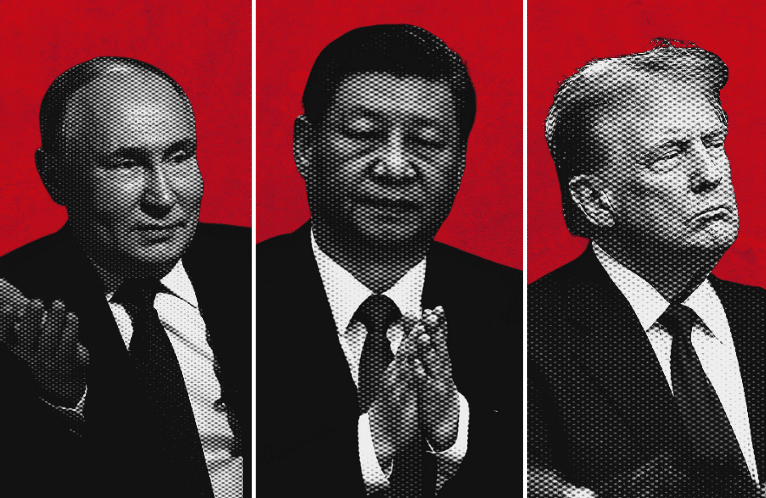Xi Jinping and Four U.S. Presidents: Personal Diplomacy Through a Decade of Change
Frantic Phone Call Failed to Halt China-Indonesia Sea Spat
Hours after reports of a confrontation between a Chinese coastguard ship and an Indonesian vessel in the South China Sea, a top Chinese diplomat called an Indonesian government official with a plea: Don’t tell the media, we are friends after all.
That request was rebuffed as officials in Jakarta called a press conference to complain about China’s actions. While Indonesia has largely been on the periphery of disputes between China and other nations over the South China Sea, the spat risks drawing the Southeast Asian nation into territorial contests in the oil-and-gas rich waters.
The Indonesian official said his government didn’t want to respond, but was forced to because China’s actions were especially provocative, and fitted a pattern of becoming more assertive in the waters. The official didn’t want to be named because of the sensitivity of the incident. The Chinese embassy didn’t answer four phone calls or reply to two e-mails asking about the call.
The behind-the-scenes diplomacy reveals how both sides generally prefer to keep such incidents under wraps, albeit for different reasons. Indonesia has traditionally avoided publicizing incidents in the South China Sea as it seeks to preserve economically vital ties with China. Beijing is aware of the need for international support, especially as it prepares for a ruling in The Hague on the legality of territorial claims that cross over with the Philippines.
‘Harmonious Relations’
“In the past, when incidents such as this one have occurred, Indonesia has tended to downplay them or even cover them up in the interests of harmonious relations with China,” said Ian Storey, a senior fellow at the ISEAS-Yusof Ishak Institute in Singapore. “But if China starts to try and enforce its jurisdictional claims in Indonesia’s maritime domain, Jakarta will be left with no option but to publicize Chinese actions and push back against Beijing’s assertive behavior.”
China is Indonesia’s largest two-way trading partner and President Joko Widodo is relying on it to fund much of his country’s infrastructure needs. China, keen to create a new “maritime” Silk Road trading route to the Middle East and Europe to complement a revived overland route, was one of Indonesia’s larger foreign investors in the final quarter of 2015 and the government expects it to top the list in the next five years.
Indonesian officials say a fishing patrol caught a Chinese vessel on Saturday trawling within the exclusive economic zone derived from its Natuna islands, which look onto the western section of the South China Sea. Officers detained the crew and began towing the boat. As it neared the Natuna islands, at least one Chinese coast guard vessel rammed the Chinese boat to try and free it, Indonesia Foreign Ministry spokesman Arrmanatha Nasir told reporters.
The government later submitted a protest to China’s charge d’affaires Sun Weide in Jakarta over the incident, which it classified as a violation of the “sovereignty of Indonesia’s territorial waters,” Foreign Minister Retno Marsudi said.

“We told the charge d’affaires that our relationship with China is very good and in this regard we should all respect international law,” Marsudi said. “I stress that Indonesia is not a party to the South China Sea dispute, so we are asking for a clarification about the incident.“
Chinese Foreign Ministry spokeswoman Hua Chunying told a regular press briefing on Monday the incident took place in “traditional Chinese fishing grounds.” Hua said the Chinese vessel was “attacked and harassed” by an armed Indonesian vessel.

Chinese Passports
China claims more than 80 percent of the South China Sea, one of the world’s busiest waterways, based on a so-called nine dash line for which it won’t give precise coordinates. That has brought it into dispute with Vietnam, the Philippines, Brunei and Malaysia, which also claim islands within the line.
In 2012, China issued passports showing the nine dash line encroaches on the exclusive economic zone off the Natuna Islands, but not the islands themselves. Indonesia hasn’t recognized the claim.
China’s actions in the South China Sea are testing Widodo, better known as Jokowi, who has made protecting fishing grounds against illegal encroachment a priority under his vision to turn his country into a global maritime power. The administration has blown up several dozen ships from Vietnam, Malaysia and other countries that were seized while fishing in the archipelago of 17,000 islands.
Natuna Warships
The Indonesian navy has in recent months started deploying more warships in the Natuna area and is pushing to reclaim airspace in the sensitive military area that’s currently controlled by Singapore. Natuna has 51 trillion cubic feet of recoverable gas reserves, a third of the country’s total, according to the energy ministry.
The latest incident was first publicized on Sunday by Susi Pudjiastuti, the fisheries minister, who has become a popular member of Jokowi’s cabinet for her strong stance against illegal fishing boats.
“The very heart of Jokowi’s ‘global maritime fulcrum’ vision is a determination to protect Indonesia’s sovereignty,” said Natalie Sambhi, a research fellow at the Perth USAsia Centre focusing on Indonesian foreign and defense policy. “Staying silent in this case will be a sign that his administration is willing to tolerate sovereignty violations when the going gets really tough.”
China Missiles
The incident follows others this year that have focused attention on China’s intentions in the disputed waters, including the placement of surface-to-air missiles on an island in the Paracel chain and preventing Philippine boats accessing fishing grounds in the Spratly chain.
The Global Times, a newspaper published by the Communist Party’s flagship People’s Daily, urged both sides to show restraint and focus on shared interests such as a high-speed rail link that China is building between Jakarta and Bandung.
“China does not wish for disputes with several neighboring countries in the South China Sea all at the same time,” the paper said in an editorial Wednesday. “The Natuna Islands belong to Indonesia,” it said. “China has no objection to it. But Indonesia’s EEZ is overlapping part of the nine dash line, which makes fishery disputes in the area inevitable.”
It’s unclear if the Chinese actions were calculated to test Indonesia’s resolve or were a captain going beyond the standard operating procedure, said Euan Graham, director of the international security program at the Lowy Institute in Sydney. The exact location of the incident will be crucial as to whether Indonesia takes a harder position, he said.
“Intrusions around the EEZ are not new, and Indonesia under this administration and the previous ones have taken a deliberately non-confrontational approach,” he said. “What could flip that is if this was proven to be in violation of Indonesian sovereignty. It would be very difficult for the government to say one law applies to Thailand and Vietnam, and not to China.”
By CHRIS BRUMMITT Mar. 22, 2016 on Bloomberg
Read more here








